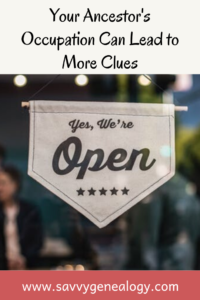Your Ancestor’s Occupations Can Lead to More Clues
It’s May Day today! Do you know what that means? It means that the Scandinavian people get the day off from work. It’s a National holiday for most Scandinavians and they enjoy it to the fullest. Actually, they start celebrating the day before May Day because they also get this day off as well in celebration of spring and summer right around the corner. Why am I talking about this holiday? Because it reminds me of my ancestor’s occupations or jobs that they had throughout their lives. May Day is a celebration of work. We use Labor Day as our celebration of work here in America, but Scandinavians choose to use May Day.

Anciently, the day before May Day was considered then end of the administration period and was celebrated by the merchants and craftsman with dancing, singing, and preparation for spring celebrations. The farmers and peasants would use this day as their annual village meeting and to select a new alderman. Bonfires would be lit to scare off predators and the farmers’s livestock would be let out to graze openly.
Today, they still celebrate with bonfires the day before May Day, sing, dance, and party long into the night. They’re not worried about partying late because May Day is a national holiday and most everyone has it off. On May Day, they have parades and other demonstrations that people can join if they wish or pursue other pastimes. If you would like to learn more about how Sweden celebrates this holiday, then visit this link. The other Scandinavian countries have similar celebrations for this holiday.
How Do You Find Your Ancestor’s Occupations?
Sometimes, we think that our ancestor’s occupation is just an interesting bit of information and we toss it aside as not important. Sometimes we are right to think that way. However, other times those occupations can lead to other records that give us more insight into another person’s life.
Many records can give you those occupations. The easiest one is the census record, which the occupation was commonly asked almost every census year. As a genealogist, it was fun to learn that your ancestor was a baker, farmer, or shoemaker. It’s also interesting to see the patterns of jobs handed down from generation to generation. How many ancestors in your family tree were farmers? Did they work the same land? Did the main farm split the land into smaller farms for their children and grandchildren? Sometimes, you will get those answers from census records. In other cases, you need to find other records to fill in the blanks.

Church records will also list occupations for the parents. Usually the father had a job outside the home and the mother was listed as a housewife as her job. This can help when you have people with the same name, but their jobs are different. Then you can find your correct ancestor by their job. For example, there can be two Per Olson’s in the same village, but if one is a farmer and the other is a wagon maker, then you decide which one is your ancestor.
Marriage records will show occupations for the bride and groom as well as their parents depending on the state or country you’re looking in. Death records can also list them if the nearest relative was a parent or spouse. This helps determine that you still have the correct ancestor.
Immigration records will also list occupations especially if they had an occupation in the old country. This is another way you can determine the correct ancestor. It can also help you find your ancestor when you start looking in the old country for records.
What Other Records Can You Find From Occupations
Let’s say your ancestor was a farmer. If he farmed in America during the 1800’s, then this can lead to Non-Population Schedules. These are records that inventory everything that the farmer had at that time. They include livestock, grain, household items, machinery, etc. It’s very detailed and you can get a sense if they were wealthy or poor farmers. It also shows if the farm was divided among others to run, but not to own.
Church records can lead to newspaper accounts of the birth, marriage, or death. Obituaries can have occupations listed and maybe it’s history. Newspapers might tell a company’s story and their employees. The building where your ancestor worked might still be around.

If your ancestor worked in the city, then the city directories might be a good record to search. They will often list the company’s name along with the occupation beside the person’s name. These records can also give you a street address that’s fun to look up to see what that address is now.
The point is don’t dismiss your ancestor’s occupation as mere interesting information. You can use it to find other records that will lead to more records and so on. Use it to relive the life that your ancestor lived. Walk in their shoes and feel what successes and frustrations they dealt with. I know from experience that this can be therapeutic. It can answer many questions for the family historian about their ancestor.
Conclusion
Occupations can be valuable for a family historian or genealogist. I learned not to discount an occupation as a common unremarkable one. Even a farmer can lead an extraordinary life if you just dig a little deeper into their occupation. Occupations are a major part of anyone’s life. It can shape a person and mold their character. So the next time you see someone’s occupation on a census record or church record, then imagine what life they must have led doing that job. You just might be surprised what you will find when you dig a little deeper.
In the meantime…good luck and happy hunting!
Tiffany
P.S. If you want to learn more about another holiday that the Scandinavians love, then click on the link below for another of my blog posts.




